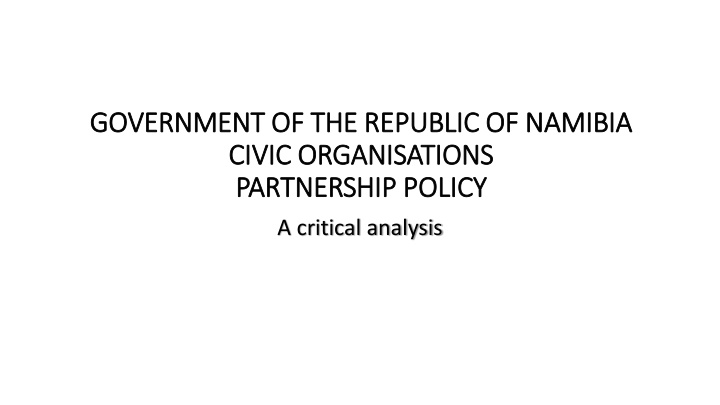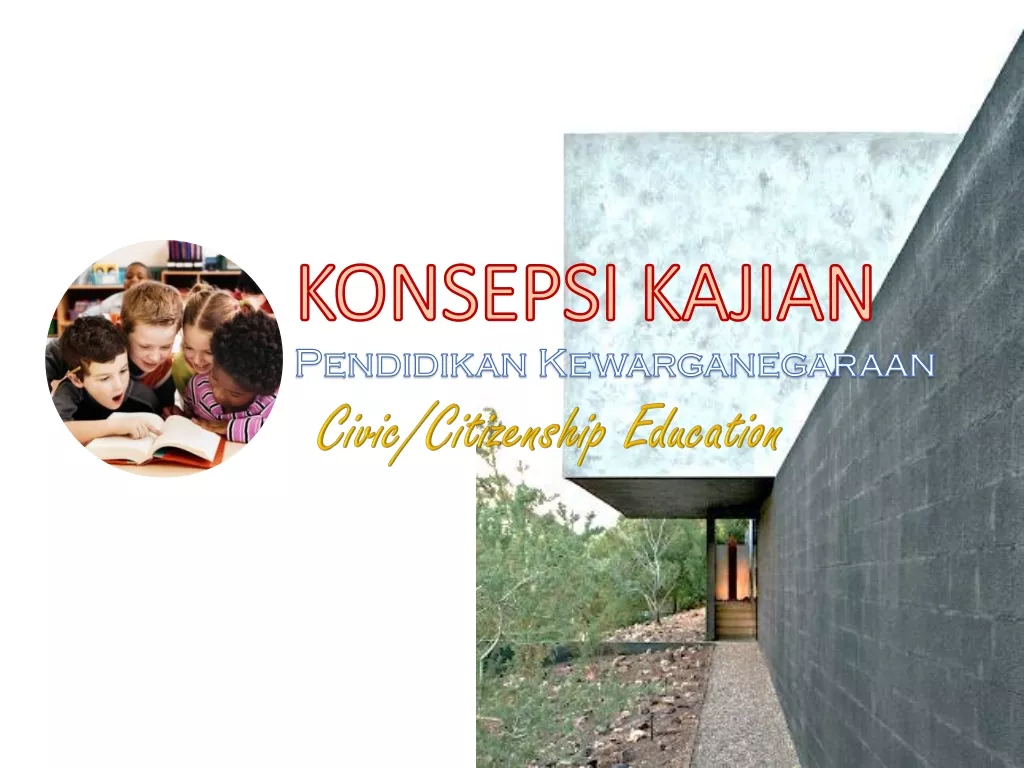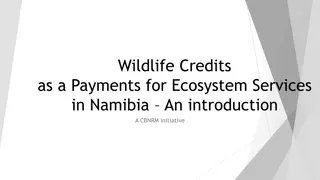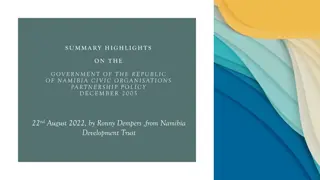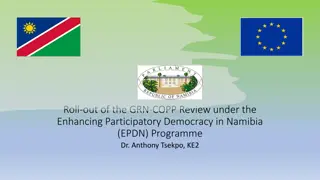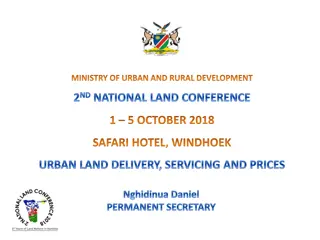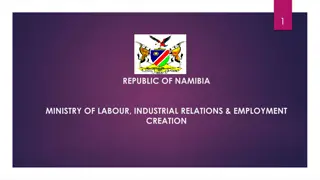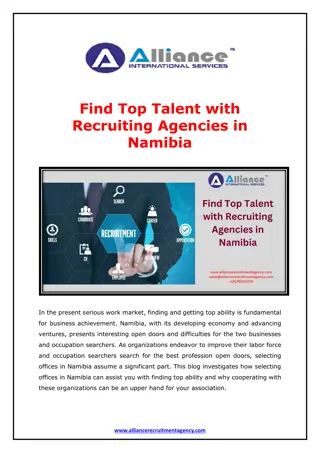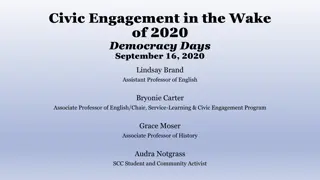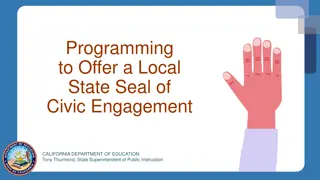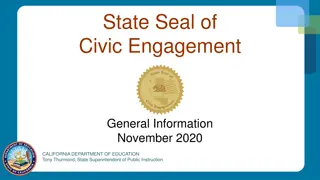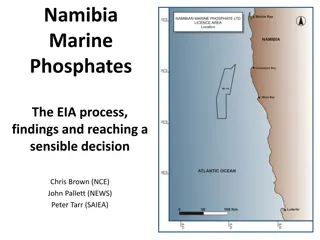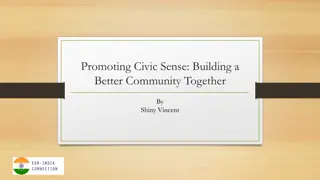Analysis of Civic Partnership Policy in Namibia
This critical analysis delves into the principles, objectives, and strategies outlined in the Civic Partnership Policy of the Government of the Republic of Namibia. The goal is to enhance civic participation and build a transparent, voluntary partnership framework for civic organizations. The policy aims to foster mutual respect, trust, and equality while encouraging active citizenship and collaboration between the government and civil society.
Uploaded on Mar 08, 2025 | 1 Views
Download Presentation

Please find below an Image/Link to download the presentation.
The content on the website is provided AS IS for your information and personal use only. It may not be sold, licensed, or shared on other websites without obtaining consent from the author.If you encounter any issues during the download, it is possible that the publisher has removed the file from their server.
You are allowed to download the files provided on this website for personal or commercial use, subject to the condition that they are used lawfully. All files are the property of their respective owners.
The content on the website is provided AS IS for your information and personal use only. It may not be sold, licensed, or shared on other websites without obtaining consent from the author.
E N D
Presentation Transcript
GOVERNMENT OF THE REPUBLIC OF NAMIBIA GOVERNMENT OF THE REPUBLIC OF NAMIBIA CIVIC ORGANISATIONS CIVIC ORGANISATIONS PARTNERSHIP POLICY PARTNERSHIP POLICY A critical analysis
The why? The why? To improve upon the current legislative and institutional framework within which Civic Organisations operate Advocating for the formulation of a New Bill , to establish a transparent, voluntary, parallel registration process in order to complement existing provisions and to nurture the principles of partnership.
PRINCIPLES UNDERLYING THE POLICY PRINCIPLES UNDERLYING THE POLICY CORE VALUES AND GUIDING PRINCIPLES OF PARTNERSHIP: mutual respect (respect the independence of Cos) trust equality. enhancing communication between collaborative partners in an open and frequent manner.
The Overall Goal The Overall Goal [ ] is for the Government, in consultation with civil society, to create a Working Partnership , a partnership that works for the entire country, its citizens and their civic organisations and for the Government. Obtainable through four (4) objectives
OBJECTIVE 1 OBJECTIVE 1 To create a greater commitment for civic participation through the promotion and encouragement of active citizenship. Implementing strategy: Frowning on imported models of civic participation from the West [ ] [ ] engaging traditional elders and village groupings in discussions that draw from traditional practices that contribute to civil society. Assessment: rent seeking western funded organisations narrative of African governments Narrative to be strongly denounced Insulting to say the least Tas to manufacturing consent?
OBJECTIVE 2 OBJECTIVE 2 To enhance the environment for civic participation and partnership. Implementation Strategies: Voluntary registration of COs on the database Legal and regulatory environment for CO registration/incorporation Code of Good Practice Assessment: Voluntary registration = undue duplication Potential backdoor censorship & malignment Silencing critical voices Self regulation preferred Self regulating Code of Conduct for CSOs
OBJECTIVE 3 OBJECTIVE 3 To bring the Government closer to the people and create partnership opportunities that benefit the Government, civic organisations and the civil society. Implementation Strategies exchange and flow of information on development activities for better co-ordination in order to minimise wastage of resources. establishing regular fora for dialogue between COs and line Ministries and the dissemination of draft policies and bills Measure the impact of partnership in development through an impact monitoring system Assessment: Consistent with Article 95(k) Consistent with international human rights law Silent of the proactive disclosure of information (new ATI law) Meaningful and effective participation
OBJECTIVE 4 OBJECTIVE 4 To enhance the capacity of partners (Government and civic organisations) to enter into partnerships and jointly respond to development challenges and opportunities in an efficient, effective and sustainable fashion. Implementation Strategies: NPC to facilitate networks and linkages between GRN and CSOs NPC shall assist in mobilising support to establish sustainable mechanisms to assist COs and strengthen their institutional capacity building. Assessment: Encouraging Human rights obligation to provide Capacity gap a real issue For example, indigenous peoples organisations, PWDs organisations No strings attached to be attached though
INSTITUTIONAL FRAMEWORK Codification of an Advisory Committee (National Planning Commission Act, 1994 (Act 15 of 1994). Representatives of Government, NPC, COs, Regional Governments and Local Authorities. Broad mandate Assessment: Good initiative Equal representation Avoid Government monopoly Independence critical
Overall impressions Overall impressions A policy indeed needed Develop and ensure a robust accountability framework, evaluation process and accountability mechanisms. Need to synergise the rational, underlying principles, and objectives amongst all partners All partners should share a similar vision on human rights-based development Policy should aligned to international human rights standards and principles There should be a higher aim involved in the partnership rather than partnering for partnership s sake.
Partnership Principles Vision All partners should share a similar vision on human rights-based development (Equality, Participation, etc.) and should align to the Istanbul Principles on CSO Development Effectiveness3 . The vision and mission statements of all partners should be sufficiently compatible to allow them to collaborate. There should be a higher aim involved in the partnership rather than partnering for partnership s sake. The partnership shall aim, amongst other things, to connect local issues to global discussions and local voices to a global audience.
